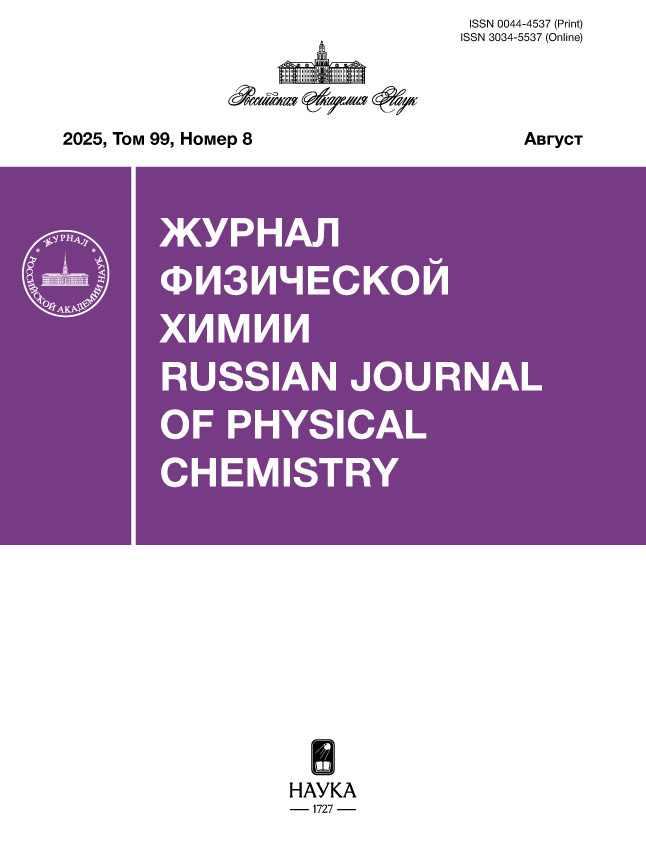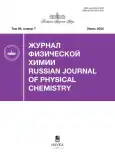Аппроксимация альтернированных температур плавления гомологов с использованием рекуррентных соотношений второго порядка
- Авторы: Зенкевич И.Г.1
-
Учреждения:
- Санкт-Петербургский государственный университет, Институт химии
- Выпуск: Том 99, № 7 (2025)
- Страницы: 1063-1074
- Раздел: СТРОЕНИЕ ВЕЩЕСТВА И КВАНТОВАЯ ХИМИЯ
- Статья получена: 17.10.2025
- Статья опубликована: 15.07.2025
- URL: https://vestnik.nvsu.ru/0044-4537/article/view/693648
- DOI: https://doi.org/10.7868/S3034553725070127
- ID: 693648
Цитировать
Полный текст
Аннотация
Рекуррентные соотношения первого порядка A(nC + 1) = aA(nC) + b применимы для аппроксимации вариаций различных свойств органических соединений (А) в гомологических рядах, иначе, в зависимости от числа атомов углерода в молекулах, nC. Однако они непригодны для аппроксимации температур плавления (Тплавл) из-за альтернирования их значений у гомологов с четным и нечетным числом атомов углерода в молекулах для многих рядов. Подтверждено, что решение этой задачи возможно с использованием рекуррентных соотношений второго порядка, A(nC + 2) = aA(nC) + b. Предложено объяснение этого факта: алгебраическое нерекуррентное решение этого рекуррентного уравнения, содержит сомножитель (–√а)nC, знак которого является функцией четности или нечетности числа атомов углерода в молекуле. Подобный вид функций для характеристики альтернированных свойств гомологов предложен впервые. Показано, что для достижения наибольшей точности аппроксимации необходима предварительная статистическая обработка значений Тплавл из разных источников с вычислением средних значений, их стандартных отклонений и отбраковкой ненадежных данных. В качестве примера такой обработки подробно рассмотрен пример Тплавл н-алканкарбоновых кислот с 0 ≤ nC ≤ 35. Ошибки рекуррентной аппроксимации Тплавл гомологов характеризуемым методом не превышают стандартных отклонений рандомизованных межлабораторных данных.
Об авторах
И. Г. Зенкевич
Санкт-Петербургский государственный университет, Институт химии
Email: izenkevich@yandex.ru
Санкт-Петербург, Россия
Список литературы
- Столяров Е.А., Орлова Н.Г. Расчет физико-химических свойств жидкостей. Справочник. Л.: Химия, 1976. 112 с.
- Рид Р., Шервуд Т. Свойства газов и жидкостей. Пер. с англ. Л.: Химия, 1971. 703 с.
- Abramowitz R., Yalkowsky S.H. // Pharm. Res. 1990. V. 7. № 9. P. 942.
- Wei J. // Ind. Eng. Chem. Res. 2000. V. 39. P. 3116. doi: 10.1021/ie9909439.
- Chikos J.S., Nichols G. // J. Chem. Eng. Data. 2001. V. 46. № 3. P. 562. doi: 10.1021/ie0002235.
- Bondarchuk S.V. // Fire Phys. Chem. 2023. V. 9. P. 160. doi: 10.1016/j.fpc.2021.11.001.
- Chickos J.S., Nichols G., Ruelle P. // J. Chem. Inf. Comput. Sci. 2002. V. 42. № 2. P. 368. doi: 10.1021/ci010341b.
- Jain A., Yang G., Yalkowsly S.H. // Ind. Eng. Chem. Res. 2004. V. 43. № 23. P. 7618. doi: 10.1021/ie049378m.
- Akash J. Estimation of melting points of organic compounds. PhD Thesis. Arizona Univ. 2005. 183 p. http:// hdl.handle.net/10150/193516
- Jain A., Yalkowsky S.H. // J. Pharm. Sci. 2006. V. 95. № 12. P. 2562.
- Li H., Higashi H., Tamura K. // Fluid Phase Equil. 2006. V. 239. № 1. P. 213. doi: 10.1016/j.fluid.2005.11.004.
- Ponce A.A.P., Salfate I., Pulgar G., et al. // J. Eng. Thermodynam. 2013. V. 22. № 3. P. 226. doi: 10.1134/S1810232813030065.
- Yalkowsky S.H., Alantary D. // J. Pharm. Sci. 2018. V. 107. № 5. P. 1211. doi: 10.1018/j.xphs.2027.12.013.
- Crepnjak M., Tratnik N., Pletersek P.Z. // Fullerenes, Nanotubes, Carbon Nanostructures. 2018. V. 26. № 5. P. 239.
- Dearden J.C. // Sci. Total Environ. 1991. V. 109–110. P. 59. doi: 10.1016/0048-9697(91)90170-j.
- Katritzky A.R., Maran U., Karelson M., Lobanov V.S. // J. Chem. Inf. Comput. Sci. 1997. V. 37. P. 913. doi: S0095-2338(97)00027-9.
- Paster I., Shacham M., Brauner N. // Proc. 18th European Symp. on Computer Aided Process Eng. – ESCAPE18. Lyon, France. 2008. P. 895.
- Karthikeyan M., Glen R., Bender A. // J. Chemometr. Inf. Modeling. 2005. V. 45. № 3. P. 581. doi: 10.1021/ci0500132.
- Nigsch F., Bender A., van Buuren B., et al. // J. Chem. Inf. Model. 2006. V. 46. № 6. P. 2412. doi: 10.1021/ci0601149f.
- Habibi-Yangjen A., Pourbasheer E., Danandeh-Jenagharad M. // Bull. Korean Chem. Soc. 2008. V. 29. № 4. P. 833.
- Lazzus J.A. // Chinese J. Chem. Phys. 2009. V. 22. № 1. P. 19. doi: 10.1088/1674-0068/22/01/19-26.
- Hasanzadeh-Nazarabadi Y., Modarresi S.M., Jafari S.B. // Proc. The 8th Int. Chem. Eng. Congress (IChEC2014). Kish, Iran. 2014.
- Tetko I.V., Lowe D.M., Williams A.J. // J. Cheminform. 2016. V. 8. № 2. doi: 10.1186/s13321-016-0113-y.
- Whiteside T.S., Hilal S.H., Brenner A., Carreira I.A. // // SAR & QSAR Environ. Res. 2016. V. 27. № 8. P. 677. doi: 10.1080/1062936X.2016.1217270.
- Klimanova O., Miryashkin T., Shapeev A. // Phys. Rev. B. 2023. V. 108. № 184103. doi: 10.1103/PhysRevB.108.184193.
- Romanova L.M. // Izv. Vysshikh Uchebn. Zaved. Ser. Fizika. 1975. № 8. P. 122.
- Tsuchiya Y., Hasegawa H., Iwatsubo T. // J. Chem. Phys. 2001. V. 114. P. 2484. doi: 10.1063/1.1338508.
- Zhang Y., Maginn E.J. // Ibid. 2012. V. 136. № 144116. doi: 10.1063/1.3702587.
- Slovokhotov Y.L., Neretin I.S., Howard J.A.K. // New J. Chem. 2004. V. 28. P. 967. doi: 10.1039/B310787F.
- Slovokhotov Y.L., Batsanov A.S., Howard J.A.K. // Struct. Chem. 2007. V. 18. P. 477. doi: 10.1007/s11224-007-9167-9.
- McDonagh J.L., van Mourik T., Mitchell J.B.O. // Molecular Informatics. 2015. V. 34. № 11–12. P. 715. doi: 10.1002/minf.20150052.
- Brauner N., Shacham M. // AIChE J. 2013. V. 59. № 10. P. 3730.
- Dearden J.C. // Environ. Sci. Chem. 2003. V. 22. № 8. P. 1696. doi: 10.1897/01-363.
- Internet Melting Point Predictor. aatbio.com/tools/predictive-modeling/melting-point-predictor
- Etessam A.H., Sawyer M.F. // J. Soc. Petrol. Ind. 1939. V. 25. P. 253.
- Stallberg G., Stallberg-Stenhagen S., Stenhagen E. // Acta Chem. Scand. 1952. № 6. P. 313.
- Broadhurst M.G. // J. Res. Nat. Bureau Stand. A. Phys-Chem. 1962. V. 66A. № 3. P. 241.
- Somayajulu G.R. // Int. J. Thermophys. 1990. V. 11. P. 555.
- Вигдергауз М.С., Петрова Е.И. // Успехи химии. 1992. Т. 61. № 12. С. 2172.
- Larsson K. // J. Amer. Oil Chem. Soc. 1966. V. 43. № 10. P. 559. doi: 10.1007/BF02641187.
- Жданов Ю.А. Гомология в органической химии. М.: Изд. МГУ, 1950. 98 с.
- Boese R., Weiss H.-C, Blaser D. // Angew Chem. Int. Ed. 1999. V. 38. № 7. P. 988. doi: 10.1002/(SICI)1521–3773(19990401)38:7.
- Bond A.D. // New J. Chem. 2004. V. 28. № 1. P. 104. doi: 10.1039/B307208H.
- Sedunov B., Brondz I. // Sci. Res. 2017. V. 3. № 1. P. 1. doi: 10.4236/vp.2017.31001.
- Tregubov D., Tarakhno O., Deineka V., Tregubova F. // Solid State Phenomena. 2022. V. 334. P. 124. doi: 10.4028/p-375133.
- Thalladi V.R., Boese R., Weiss H.-C. // Angew Chem. Int. Ed. 2000. V. 39. № 5. P. 918. doi: 10.1002/(SICI)1521-37732000030339:5.
- Thalladi V.R., Nusse M., Boese R. // J. Amer. Chem. Soc. 2000. V. 122. № 38. P. 9227. doi: 10.1021/ja0011459.
- Thalladi V.R., Boese R., Weiss H.-C. // J. Amer. Chem. Soc. 2000. V. 122. № 6. P. 1186. doi: 10.1021/ja9934221.
- Зенкевич И.Г. // Журн. общ. химии. 2006. Т. 76. № 11. С. 1816. [Zenkevich I.G. // Rus. J. Appl. Chem. 2006. V. 76. № 11. P. 1738. doi: 10.1134/S1070363206110119.].
- Zenkevich I.G. // Global J. Sci. Frontier Res.: B. Chemistry. 2024. V. 24. № 1. Version 1.0. P. 21. doi: 10.34257/GJSFRBVOL24IS1PG21.
- Lide D.R. (Ed.) CRC Handbook of Chemistry and Physics on CD-ROM. Boca Raton, FL: CRC Press, Taylor & Francis. 2006. CD-ROM.
- Withnall M., Chen H., Tetko I.V. // ChemMedChem. 2017. V. 12. P. 1. doi: 10.1002/cmdc.201700303.
- Zenkevich I.G., Babushok V.I., Linstrom P.J., et al. // J. Chromatogr. A. 2009. V. 1216. P. 6651. doi: 10.1016/j. chroma.2009.07.065.
- Зенкевич И.Г. // Вестн. СПбГУ. Сер. 4. Физ.-хим. 2016. Т. 3 (61). С. 419. [Zenkevich I.G. // Rep. St. Petersburg State Univ. Ser. 4.Phys.-Chem. 2016. V. 3 (61). P. 419. doi: 10.21638/11701.spbu04.2016.409.]
Дополнительные файлы








